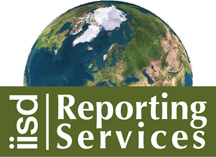News * Abou us * the ENB team * DONATE * Activities * Search * IISD RS home * IISD.org * RSS * What is RSS? * Links |
|
MEA Bulletin Guest Article
Tuesday,
30 October 2007 RESOURCE FOCUS: Multilateral Environmental Agreement Negotiator’s Handbook The second edition of Multilateral Environmental Agreement Negotiator’s Handbook offers an introduction to negotiating or working on Multilateral Environmental Agreements (MEAs) for those with little or no background, as well as a reference tool for experienced negotiators. It contains technical information and advice in an accessible format, making no assumptions that the reader has any specific knowledge. The Handbook was prepared by Environment Canada, the UN Environment Programme and Joensuu University. Maurice Strong, in his introductory message in the Handbook, writes that “It strikes me that it would have been very helpful to have had access to this handbook back in 1972 [the Stockholm Conference]. At that time we still had to work out the ideas, tools and approaches you can now find in the following pages of this handbook.” The Handbook offers a brief history of MEAs and major conferences. It lays out the elements of MEAs, common provisions and how they work together, reviews the rules of the game, from the basics of treaty law to rules of procedure and finance, and gives an overview of the playing field and the players. The Handbook also looks at structures and roles; provides approaches to drafting and strategic issues; surveys international cooperation issues; provides a synthesis perspective; and looks at a typical day in negotiations, negotiation products, and a checklist. Appendices provide reference tools, including a glossary. The Handbook begins with “Twelve essentials” for negotiators, including reminders that representing your country in a multilateral negotiation is a serious undertaking and a major responsibility, not to be entered into lightly, and to prepare as much as possible to understand the subject of the negotiations, your country’s interests, and the interests of other countries. It suggests that negotiators learn about the forum and its rules of procedure, both formal and informal, support the process and participate constructively even in difficult situations, and look for win-win situations. It offers hints for how to look for opportunities to support countries with different interests where possible, and to treat other participants courteously and honestly, underscoring that good relationships and trust are invaluable assets in negotiations. It suggests that humor and diplomacy can be very persuasive, and negotiators should focus on substantive objectives and be flexible on wording when their instructions allow. It proposes that negotiators consider workshops or informal groups as mechanisms that may help to resolve an impasse, and reminds them that responsible judgment is essential, they should listen carefully to what is said and, just as importantly, to what is not said, and they should prepare carefully for interventions, with a clear focus on objectives. Finally, it suggests being prepared for practical necessities, including alternative transportation, alternative meals, and local currency, because a negotiator’s life is unpredictable, and meals do not always happen when planned! The Handbook can be accessed at: http://www.unep.org/DEC/docs/MEAs_Negotiator's_Handbook.pdf |

